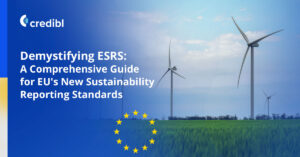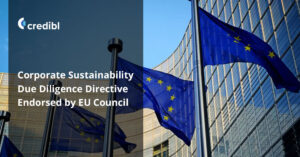In today’s ever-evolving business landscape, there’s a heightened awareness surrounding the interplay between corporate responsibility and brand value. At the center of this transformation is the concept of Environmental, Social, and Governance (ESG). ESG metrics, once seen as the realm of niche investors, have now become pivotal indicators of a company’s future prospects and long-term sustainability.
However, beyond just a mere evaluation tool, ESG has become an influential factor in shaping a company’s reputation and brand value. So, what exactly is ESG, and why is it creating such a buzz in the corporate world?
1. Understanding ESG: Beyond the Acronym
ESG Explained
Environmental, Social, and Governance (ESG) is a framework for assessing a company’s commitment to sustainable practices. While ‘Environmental’ focuses on the company’s impact on the natural world, ‘Social’ addresses the company’s relationships with its employees, customers, and the communities in which it operates. ‘Governance’, on the other hand, deals with the company’s leadership, executive pay, and shareholder rights.
ESG and Corporate Reputation
As consumers become more educated and socially conscious, they’re demanding more from the brands they engage with. A company’s ESG performance can, therefore, have a direct impact on its reputation. Positive ESG practices can enhance a company’s image, while negative ones can tarnish it.
The Link to Financial Performance
There’s an increasing body of evidence suggesting that companies with strong ESG performance are more financially resilient. This is because they’re often better positioned to navigate regulatory changes, attract top talent, and drive customer loyalty.
Incorporating ESG into Business Strategy
While ESG metrics provide a snapshot of a company’s sustainability performance, they also offer insights into potential business risks and opportunities. By integrating ESG into their core strategy, companies can anticipate market shifts and innovate ahead of the curve.
2. Reputation Management: The ESG Effect
The Power of Positive Perception
In a hyper-connected world, reputation is everything. Companies with a strong ESG track record are often viewed as forward-thinking, responsible, and reliable. This positive perception can significantly elevate their brand value.
Addressing the Skeptics
However, not everyone’s convinced about the ESG wave. Critics argue that it’s just another corporate fad. But the numbers tell a different story. A strong ESG profile can lead to better financial performance, higher investor interest, and increased customer loyalty.
Reputation Recovery through ESG
No company is perfect. Mistakes happen. However, companies that have invested in ESG practices often find it easier to recover from reputation setbacks. Their commitment to responsible practices shows stakeholders that they’re serious about making amends.
Navigating the ESG Reporting Maze
Reporting on ESG metrics is a complex task, and there’s no one-size-fits-all approach. By understanding what’s material to their business and stakeholders, companies can present a more accurate and meaningful ESG picture.
The Role of Transparency
Transparency is the cornerstone of reputation management in the ESG era. Companies need to be open about their ESG successes and failures. This openness fosters trust and helps build a resilient brand reputation.
3. Brand Value Enhancement through ESG
Building a Sustainable Brand
The modern consumer is more discerning than ever before. They’re looking for brands that align with their values and beliefs. ESG offers companies a clear path to build a brand that’s not just profitable, but also sustainable.
Engaging the Conscious Consumer
Today’s consumers are not just looking for quality products; they also want to know that their purchase is making a positive difference. By championing ESG practices, brands can engage this new breed of conscious consumers and drive brand loyalty.
Future-proofing the Brand
In an uncertain world, companies need to be agile and adaptive. ESG practices help companies anticipate potential risks and adapt their strategies accordingly. This proactive approach can safeguard a brand’s value in the long run.
Striking the Right Balance
While ESG is a powerful tool for enhancing brand value, companies need to ensure that their ESG efforts are genuine and not just a marketing gimmick. Authenticity is critical to winning the trust of stakeholders and consumers.
4. Stakeholder Engagement: ESG’s Secret Weapon
The Power of Collaboration
Collaboration is at the heart of ESG. Companies can gain insights into emerging trends, potential risks, and untapped opportunities by engaging with stakeholders. This collaborative approach can supercharge a company’s ESG efforts.
Building Bridges with Investors
Investors are increasingly factoring in ESG metrics when making investment decisions. By actively engaging with investors and showcasing their ESG achievements, companies can attract capital and boost their stock prices.
Strengthening Community Ties
Communities play a pivotal role in a company’s ESG journey. By working closely with communities, companies can ensure that their ESG efforts have a meaningful and lasting impact.
The Employee Factor
Employees are a company’s most valuable asset. They’re also its most vocal advocates or critics. By aligning their ESG practices with employee values, companies can foster a culture of trust and collaboration.
5. The Future of ESG in Business
Beyond the Hype
While ESG has become a buzzword in corporate circles, its significance goes beyond mere hype. As regulatory frameworks evolve and stakeholder expectations shift, ESG will play a central role in shaping the future of business.
The Role of Technology
Technology is a double-edged sword. While it offers companies tools to monitor and improve their ESG performance, it also poses new challenges. Companies need to harness the power of technology while being mindful of its implications.
The Regulatory Landscape
Regulation is a driving force behind the ESG movement. As governments across the world tighten their regulatory frameworks, companies will need to up their ESG game to stay compliant and competitive.
Collaborating for a Better World
The challenges facing our world are too big for any single company to tackle alone. Collaboration is the key to addressing these challenges. By joining forces with stakeholders, companies can drive meaningful and lasting change.
In conclusion, the symbiotic relationship between ESG and corporate reputation is undeniable. As we navigate the challenges and opportunities of the modern business landscape, ESG offers companies a roadmap to build a brand that’s not just profitable, but also purposeful. Whether you’re a business leader, an investor, or a consumer, understanding the profound impact of ESG on brand value, stakeholder trust, and corporate reputation is essential.







